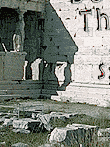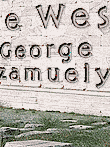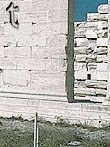The
"correct" candidate – or the Clinton Administration’s
man – in Peru is Alejandro Toledo. He has served in the Peace
Corps, has a PhD from Stanford, a Belgian wife, teaches
at a business school and has worked at the World Bank. Fujimori,
on the other hand, has fallen out of favor in Washington.
He does not follow orders. According to a Business Week
Fujimori has turned out to be a disappointment. Despite
his "overwhelming victory in the 1995 poll, the much-predicted
second wind never materialized. Privatization income, for
instance, fell to a mere $300 million in 1999. That was
down from a peak of $2.6 billion in 1994….What’s more, the
President has backtracked on plans to auction off remaining
state assets. Playing up to voters’ concerns that privatization
of state-run utilities will result in tariff hikes, he has
ruled out the sale of Lima’s water company, Sedapal, and
the country’s largest electricity generating plant, Mantaro."
Clearly Alberto is not a follower of Washington’s "market
democracy" ideology. The "international community"
has a long track record of backing the wrong horse in Peru.
Back in 1990 Washington supported the candidacy of the famous
Peruvian novelist Mario Vargas Llosa. In 1995, Washington
backed former UN Secretary General Javier Perez de Cuelhar.
Fujimori easily trounced both of them.
In
April Fujimori trounced Toledo, though you would never have
gathered that from the hysterical media coverage. He won
49.87 percent of the vote; Toledo won 40.24 percent. In
America we call a result like that a "landslide."
Fujimori seemed to be heading for a clear first round victory.
Fraud, cried Toledo and his supporters and threatened civil
unrest. The US Government supported them. According to the
Washington Post, it "started with comments from
Ambassador John Hamilton here in Lima, moved on to warnings
from the State Department and the White House and culminated
in a congressional resolution threatening sanctions."
According to Time’s Latin America bureau chief Tim
McGirk: "The fact that it supposedly took over 24 hours
to tally the last 7 percent of the vote suggests that what
was actually happening was that Fujimori was coming under
a barrage of criticism and warnings of dire consequences
if he claimed a first-round victory." White House spokesman
Joe Lockhart sounded menacing: "We expect there will
be a run-off, and I think serious questions will be raised
if the vote count indicated something otherwise….It’s very,
very important as far as the legitimacy of these elections
that the international community and the people of Peru
have faith in the process." In other words, there will
be a second round irrespective of what the actual election
results were. The United States decides whether elections
are legitimate or not. The United States decides if the
people of Peru should "have faith in the process.
Facing
overwhelming pressure, Fujimori was left with little choice
but to announce that he had indeed fallen short of an outright
victory. But what was the evidence for fraud? According
to the Washington Post, the "three days of delay in
announcing ballot tallies triggered the suspicions of US
and other international observers. These were sharpened
by computer failures and the fact that official results,
announced little by little, seemed to give Fujimori more
votes than indicated by five independent ballot samples,
including one conducted by the Organization of American
States." This is pretty slender stuff. Eduardo Stein
of the OAS has stated that he "did not have evidence
that the vote count on election day was adulterated."
Not to worry though, he hastened to reassure us, "fraudulent
activity could not be completely ruled out."
According
to David Scott Palmer, who was a member of the OAS observer
mission to Peru in April: "The vote itself was free
and fair. There were many challenges and difficulties, from
polling places opening up to two hours late, to political
propaganda too close to polling places, to a few cut ballots
(4 in all), to some defaced ballots (22 in all)….But people
could and did vote massively, without interference or systematic
partisan influence, and their votes were duly recorded,
placed into sealed transparent envelopes, and distributed
to the Office of Electoral Processing, the Armed Forces,
the National Electoral Tribunal, and every political party
representative present at each table (up to 10, though in
the 300 or so that I personally visited, there were never
more than five, and as few as one)….In my judgment, any
statement that the vote itself was fraudulent is irresponsible.
The problem, as I view it, is that politics in Peru has
become very polarized over recent weeks, with the media
on both sides (opposition and official) making all sorts
of unwarranted extrapolations. Politicians themselves, including
Toledo, have also made some statements about the vote and
the voting process that in my judgment are not warranted
on the basis of what actually happened."
The
US Government seized on a bogus "fraud" issue
to interfere in the crudest way imaginable in the democratic
process of another country. Congress was as bad as the Administration.
The House of Representatives passed a resolution, approved
by the Senate, warning that if the election was considered
unfair by international observers, the United States would
"review and modify as appropriate its political, economic
and military relations with Peru." Clinton subsequently
signed this resolution into law. Any election can be dismissed
as "unfair." One might call a US Presidential
election "unfair" when only half of those eligible
to vote bother to do so. It might also be thought "unfair"
that third party candidates are not permitted to take part
in Presidential debates. Or that media access depends on
having vast resources at one’s disposal, which in turn depends
on kowtowing to special interests. And so on.
It
is becoming increasingly clear that there is very little
the Fujimori Government can to placate its critics. They
are not interested in the process. They just want him gone.
The OAS election observation mission is now calling on Fujimori
to reconsider the date for the second round of the presidential
election. The election is scheduled for May 28. According
to Eduardo Stein that does not leave enough time for reforms.
The other day, a New York Times story led with the
following piece of editorializing: "Two weeks before
the final round of Peru’s presidential election, international
observers say they again have serious concerns that President
Alberto K. Fujimori may be preparing to steal enough votes
to ensure he wins a third term. A month ago Peru came close
to turmoil as opposition candidates and election monitors
accused the government of widespread vote tampering after
a campaign marred by smear tactics and dirty tricks. A crisis
was averted only when electoral authorities announced that
Mr. Fujimori had fallen just short of an outright first-round
victory." In typical Times fashion, assertion
follows assertion, each presented as a self-evident matter
of fact. There is the grating assumption about the purported
neutrality of "international observers" –
who are usually either in the pay of, or working for, other
governments. How can one know ahead of time that someone
"may be preparing to steal enough votes to ensure he
wins a third term"? As for "smear tactics and
dirty tricks," such things, of course, are unheard
of in the United States.











